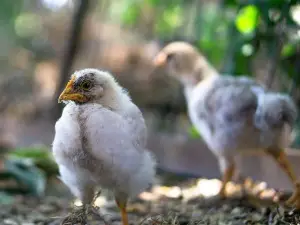
Issues with your baby chick are easy to spot but figuring out what the issue is may not be as easy, issues can include a wobbly baby chick.
This article looks into why your baby chick may be so wobbly.
Table of Contents
Why is my baby chick wobbly?
Chicks try their best not to show that they are ill or that something is wrong, if you do find signs of something wrong with your bird then the illness may be far along so action needs to be taken.
Here is why your baby chick may be wobbly:
The bird is young:
Unlike human babies, chicken babies can usually walk as soon as they start their lives out of the egg.
Many chicks will be out and about walking a few hours after hatching but that doesn’t mean that they will be well coordinated.
Some of the birds will be a little wobbly and unstable after they’ve hatched from their eggs and your baby chick may be one such bird.
What to do:
This wobbliness and incoordination may seem quite strange but it isn’t something that you’d need to worry about, it is normal.
Your wobbly bird will gain strength in its legs over time and will be able to walk properly and with no issue soon enough.
Vitamin deficiency:
If your bird has just arrived and it is wobbly then the bird may have developed a vitamin deficiency during shipping.
Shipping can be stressful on the little birds and can take a lot out of their little bodies over the days of mailing, the result may be a vitamin deficiency.
A thiamine deficiency, a vitamin E deficiency, or a selenium deficiency may be the reason behind your bird wobbling.
What to do:
Giving the bird a nutritional boost should help with this wobbliness.
In addition to the bird eating the correct type of food, and the correct amount of food for its age and size, the bird should also be taking a vitamin supplement.
Nutri-drench for poultry or chick vitamins should help.
Coccidiosis:
Another reason why your little bird may be wobbly and not be able to stand on its own may be that the bird has a condition called coccidiosis.
This is a parasitic infection that infects and damages the birds intestinal lining preventing the bird from being able to absorb nutrients from their food.
This is similar to having a vitamin deficiency. The bird could be eating well, but its body is simply not absorbing the vitamins into its body.
In addition to the baby bird having a wobbly walk, other signs of this condition include slow growth, weakness, lethargy, bloody droppings, and diarrhea.
What to do:
Amprolium is the recommended treatment for this condition in your chickens. This should be used at the first sign of this infection.
It is recommended that you take your bird to the vet for directions on how to administer this medication to your young birds.
If one of your birds is suffering from this condition it is recommended that you treat all the birds in the flock as this parasite is quite contagious and your other birds may not be showing signs of an infection.
If you enjoyed this article then you may also be interested in other bird related articles. Here are some articles that you may be interested in: Chicken Making Weird Neck Movements, Chicken Shaking Head And Lethargic, How To Make A Baby Chick Sleep, Chicken Not Eating And Walking In Circles, Baby Chick Bleeding From Vent, Baby Chick Acting Drunk, Baby Chick Stumbling, Quail Throat Movement, Quail Laying On Its Side


